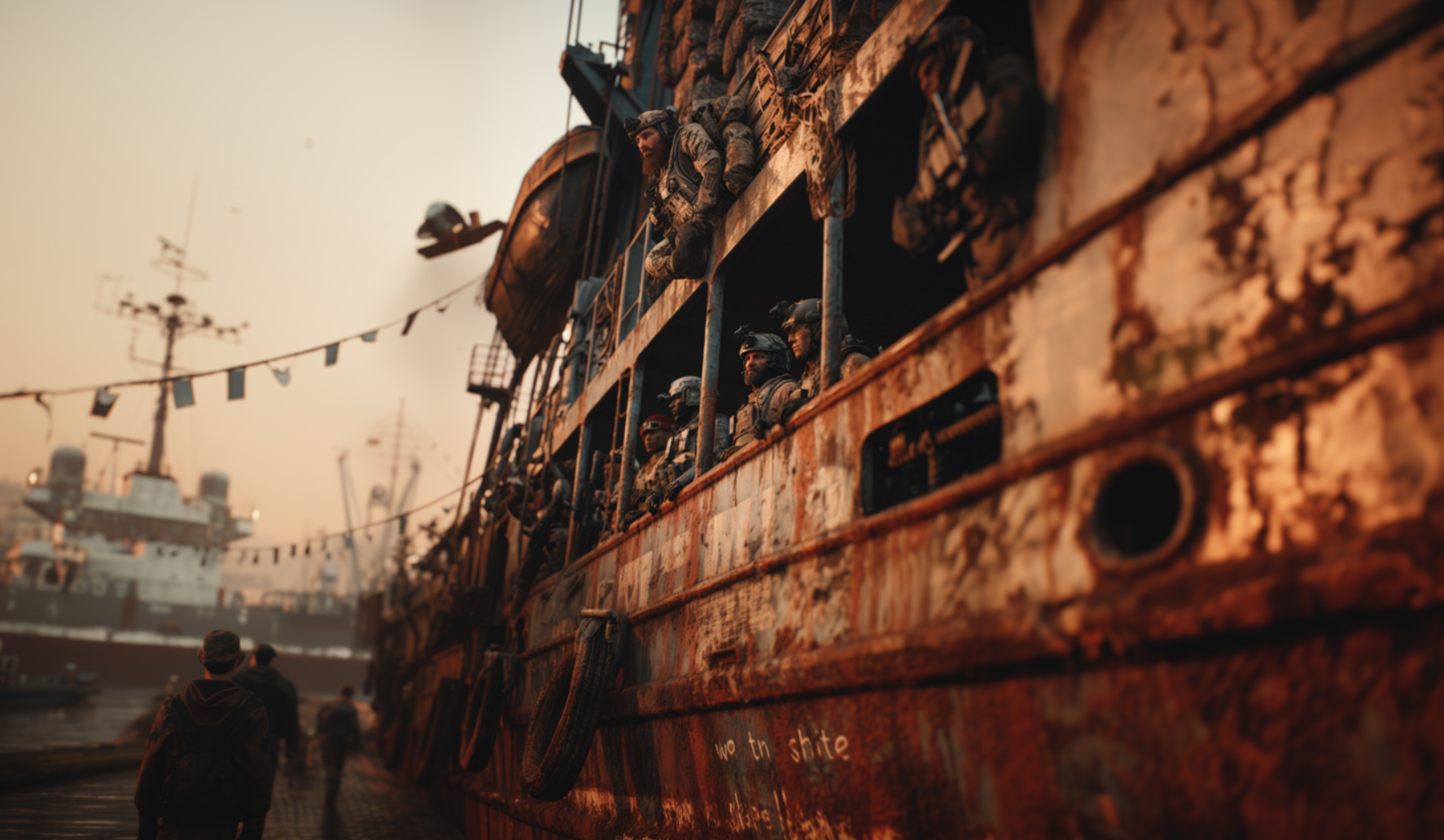The Endgame of The Russian Criminal Regime

The morning of September 19th, 2025, should have been routine for Estonian air traffic controllers. Instead, they watched three Russian MiG-31 supersonic fighters slice through their sovereign airspace without warning, transponders dark, radio silent, lingering for a brazen twelve minutes before Italian F-35s could scramble to intercept them. This wasn’t a navigation error or diplomatic miscommunication. This was the calculated provocation of a regime that has abandoned any pretense of civilized international conduct.
Three days later, the pattern continued with mechanical precision. Copenhagen Airport, Scandinavia’s busiest hub, ground to a complete halt as mysterious drones circled overhead GB NewsCNN. Thousands of travelers stranded. Oslo’s airspace closed for three hours under similar circumstances Drone sightings disrupt flights in Norway, Denmark | CNN. The perpetrators demonstrated what Danish police called the capabilities of “a capable actor” Copenhagen Airport shut down for hours by large, unidentified drones flying nearby – CBS News – sophisticated flight operations requiring significant resources and coordination.
But these aerial provocations represent only the visible edge of a much larger criminal enterprise. The real solution lies not in the skies above Estonia or Denmark, but in the waters below – specifically, in transforming the Baltic Sea into what it has effectively become: a NATO lake where passage comes with adult supervision and criminal consequences.
The Baltic Solution: Adult Supervision for Criminal Behavior
The answer to Russian provocations isn’t more fighter jet intercepts or diplomatic protests. It’s comprehensive maritime control of the Baltic Sea, with mandatory inspections for every vessel regardless of flag or declared cargo. Russian ships want to transit these waters? Absolutely – welcome to the new reality where crossing the Baltic requires behaving like responsible adults instead of international criminals.
The New Maritime Reality: Every Russian-flagged vessel entering Baltic waters would face mandatory comprehensive inspection. Not cursory document checks, but full cargo examination, crew verification, and electronic systems analysis. These thorough inspections naturally require time – perhaps three to five days per vessel to ensure complete compliance with international maritime law and security protocols.
Universal Application: But why stop with Russian ships? Any vessel of any nationality engaged in suspicious activities deserves identical scrutiny. That Panamanian-flagged cargo ship with unusual electronic signatures? Mandatory inspection. The Liberian vessel with crew manifest irregularities? Full investigation required.
This isn’t discrimination – it’s comprehensive maritime security applied equally to all potential threats. The fact that Russian commercial operations would bear the heaviest burden reflects only their regime’s documented pattern of using civilian infrastructure for military and intelligence purposes.
The Beauty of Legal Ambiguity
The most elegant aspect of comprehensive Baltic maritime security lies in its exploitation of international legal gray areas. Modern maritime law provides extensive grounds for inspection when legitimate security concerns exist – and Russia’s documented behavior creates textbook justification for such concerns.
Intelligence Operations: Discovery of sophisticated electronic equipment in shipping containers triggers legitimate counterintelligence protocols. That Russian-crewed vessel with unusual communications gear? Suspected intelligence operation requiring extensive investigation. The crew members with irregular travel patterns? Potential foreign operatives necessitating detailed background verification.
Organized Crime Connections: International maritime trafficking networks operate across multiple criminal enterprises. Any vessel with crew connections to regions known for organized crime activity – which includes much of the former Soviet space – requires enhanced scrutiny. That cargo ship with Ukrainian crew members who’ve worked Russian routes? Potential MS-13 connections requiring investigation.
Terrorist Financing: Modern terrorism operates through complex international networks. Any vessel with financial connections to regions of concern – broadly defined to include much of the Middle East, Central Asia, and Eastern Europe – might involve Hezbollah financing networks. Such serious allegations require weeks of careful investigation to resolve properly.
The accusations don’t need to be proven immediately – they just need to be plausible enough to justify extended detention while “investigations continue.” Maritime law enforcement operates on reasonable suspicion, not beyond-reasonable-doubt criminal standards.
Transforming Criminal Logistics
Russia’s hybrid warfare capabilities depend heavily on maritime logistics networks that currently operate with minimal interference. Comprehensive Baltic inspections would shatter these networks by making reliable shipping schedules impossible to maintain.
Disrupting Intelligence Networks: Russian intelligence operations rely on predictable commercial shipping for moving personnel, equipment, and communications gear. Extended inspections would force these networks to seek alternative routes through non-NATO waters, significantly increasing operational costs and complexity.
Eliminating Sanctions Evasion: Russian commercial shipping networks have become sophisticated sanctions evasion mechanisms, using complex ownership structures and flag changes to maintain prohibited trade. Comprehensive inspections would identify and impound vessels engaged in sanctions violations regardless of their paperwork sophistication.
Shutting Down Dual-Use Trade: Many legitimate commercial items become weapons components when diverted to military use. Enhanced inspections would scrutinize every cargo manifest for potential dual-use applications, creating nightmare delays for any shipment that might conceivably have military applications.
The Administrative Detention Model
The most powerful aspect of enhanced maritime security lies not in dramatic seizures but in bureaucratic detention. International maritime law provides extensive grounds for administrative holds when investigations are ongoing – and modern security concerns ensure investigations can be very, very thorough.
The Three-Week Standard: ‘Suspected Hezbollah connections’ require minimum three-week investigations to properly verify crew backgrounds, trace financial networks, and analyze cargo contents. This isn’t arbitrary – it’s the time needed for comprehensive counterterrorism assessment in complex international cases. It’s only fair.
Chain Investigation Requirements: Discovery of one suspicious element triggers mandatory investigation of related activities. That electronic equipment with Russian markings? Requires tracing the entire supply chain. Those crew members with irregular documentation? Necessitates background verification through multiple international databases.
Technical Analysis Delays: Modern cargo often contains sophisticated equipment requiring expert analysis. Determining whether electronic components have dual-use applications, whether communications gear meets international standards, or whether financial instruments comply with sanctions regimes naturally takes considerable time.
The key insight: administrative detention for investigative purposes operates under different legal standards than criminal arrest. Authorities don’t need to prove criminal activity – they just need to demonstrate ongoing legitimate investigation of potential security concerns.
Impoundment as Policy Tool
For vessels that cross legal lines, impoundment becomes a permanent solution rather than temporary inconvenience. Modern international maritime law provides extensive grounds for permanent vessel seizure when criminal activity is discovered.
Asset Forfeiture: Vessels used for sanctions evasion become subject to civil asset forfeiture regardless of ownership claims. That Russian-owned ship flying Panamanian flags to evade sanctions? The vessel itself becomes evidence in sanctions violations cases, subject to permanent government seizure.
Criminal Enterprise Involvement: Ships connected to organized crime networks – broadly defined to include much Russian commercial shipping given documented regime criminality – become subject to racketeering investigations. Under RICO-style international frameworks, entire vessels can be forfeited as instrumentalities of criminal enterprise.
Intelligence Operation Assets: Vessels used for intelligence activities against NATO interests become legitimate military targets for seizure under national security authorities. Discovery of intelligence equipment or personnel triggers national security protocols that override normal commercial shipping protections.
The Psychological Warfare Element
Beyond immediate practical effects, comprehensive Baltic maritime security would deliver devastating psychological warfare against Russian decision-makers who’ve grown accustomed to consequence-free provocations.
Destroying Predictability: Russian hybrid operations depend on reliable logistics and predictable timetables. When commercial shipping becomes unpredictably delayed by weeks of investigation, entire operational planning becomes impossible. Intelligence networks can’t function when their supply chains face random multi-week delays.
Economic Hemorrhaging: Extended detention periods impose massive costs on Russian commercial operations already struggling with sanctions pressure. Shipping schedules become meaningless when any voyage might face weeks of unexpected delay, forcing Russian companies to build huge buffer times into all Baltic operations.
International Isolation: As other nations observe Russian ships facing systematic detention while legitimate commercial vessels pass through normally, the regime’s international isolation becomes practically visible. Russian commercial partnerships become liability rather than opportunity.
Legal Framework and International Precedent
Enhanced Baltic maritime security operates within well-established international legal frameworks, making diplomatic objections difficult to sustain.
UNCLOS Article 25: Coastal states possess extensive rights to regulate shipping in territorial waters for security purposes. The Baltic’s unique geography concentrates shipping through NATO member territorial waters, providing multiple legal bases for enhanced security measures.
Port State Control: International maritime law grants port states broad authority to inspect vessels for safety, environmental, and security compliance. Enhanced inspections represent expanded application of existing port state control authorities rather than novel legal claims.
Counterterrorism Precedents: Post-9/11 maritime security frameworks provide extensive precedent for enhanced shipping inspections when legitimate security concerns exist. Russian regime behavior creates textbook justification for such enhanced security measures.
Sanctions Enforcement: Existing sanctions regimes require verification of compliance, naturally involving detailed cargo and crew inspection. Enhanced Baltic inspections simply ensure thorough sanctions compliance verification for all vessels transiting these waters.
The Broader Strategic Context
Comprehensive Baltic maritime security addresses the fundamental problem underlying Russian provocations: the regime’s calculation that consequence-free violations are possible because Western responses remain constrained by traditional diplomatic frameworks.
Russian strategy explicitly aims to “reduce Western support for Ukraine by compelling countries to redirect resources toward alliance defense” Drones shut major airport in ‘serious attack’ as U.S. allies weigh tougher Russia action – a calculation that maritime detention completely reverses. Rather than draining NATO resources, extended investigations generate revenue through detention fees while imposing costs on Russian operations.
Resource Generation: Extended investigations require payment of detention fees, inspection costs, and administrative expenses by vessel operators. Russian commercial operations would essentially fund their own surveillance and disruption through mandatory fee payments for extended inspections.
Alliance Strengthening: Rather than dividing NATO through asymmetric pressure, comprehensive maritime security would demonstrate unified resolve while generating practical benefits for alliance members. Successful sanctions enforcement and counterintelligence operations strengthen rather than drain alliance resources.
Strategic Communication: Maritime detention communicates that systematic violations of international law carry cumulative consequences extending far beyond immediate military responses. The regime’s preferred narrative of victimization becomes impossible to maintain when facing proportionate responses to documented criminal behavior.
Implementation Mechanics
The practical implementation of comprehensive Baltic maritime security would leverage existing NATO maritime capabilities while expanding legal authorities for enhanced inspection.
Inspection Facilities: Existing Baltic ports would expand detention and inspection capabilities to accommodate extended vessel holds. These facilities would generate employment and economic activity in NATO member states while processing detained vessels.
Multilateral Coordination: NATO maritime coordination centers would standardize inspection protocols, ensuring consistent application of enhanced security measures across all Baltic approaches. This coordination prevents forum shopping by vessels seeking less stringent inspection regimes.
Information Sharing: Enhanced maritime security would generate massive intelligence value through comprehensive cargo manifests, crew databases, and communications intercepts. This intelligence sharing strengthens alliance counterintelligence capabilities while building detailed pictures of Russian logistics networks.
Beyond Russian Vessels: Universal Application
The true power of enhanced Baltic maritime security lies in its universal application to all suspicious activities regardless of flag state. This prevents accusations of discriminatory targeting while catching Russian intelligence networks operating under false flags.
Flag of Convenience Operations: Many Russian intelligence and sanctions evasion operations use Panamanian, Liberian, or other flags of convenience. Universal application of enhanced security measures catches these operations regardless of paperwork sophistication.
Third-Country Cooperation: Some Russian operations involve knowing or unknowing cooperation by third-country nationals. Enhanced inspections identify and disrupt these networks while building cases against international criminal conspirators.
Commercial Cover Activities: Russian intelligence often operates through legitimate commercial partnerships with unsuspecting foreign companies. Comprehensive inspections reveal these relationships while protecting legitimate businesses from unknowing involvement in criminal activities.
The Criminal Justice Model
Enhanced Baltic maritime security represents the application of criminal justice principles to international relations – a recognition that Russia’s regime behavior has crossed from diplomatic disagreement into criminal enterprise territory.
Probable Cause Standards: Criminal justice systems operate on probable cause rather than diplomatic certainty. Russian regime behavior provides abundant probable cause for treating Russian commercial operations as potential criminal enterprises requiring enhanced scrutiny.
Investigative Detention: Criminal justice frameworks allow extended detention during ongoing investigations. Maritime inspections simply apply these principles to international shipping when legitimate security concerns exist.
Asset Forfeiture: Criminal enterprises forfeit assets used in criminal activity. Russian commercial shipping networks involved in sanctions evasion or intelligence operations become subject to legitimate asset forfeiture proceedings.
Conclusion: Adult Supervision for Criminal Behavior
The Baltic Sea has effectively become a NATO lake – it’s time for NATO maritime policy to reflect this reality. Russian vessels wanting to transit these waters can do so, but only under adult supervision and with full accountability for their regime’s criminal behavior.
Enhanced Baltic maritime security doesn’t represent escalation – it represents the application of law enforcement principles to a regime that has forfeited the presumptions and courtesies extended to legitimate governments. When a country systematically commits war crimes while conducting terror operations against civilian infrastructure, its commercial shipping loses the presumption of innocent passage.
The Core Message: Cross our waters if you must, but do so as supervised criminals rather than legitimate commercial operators. Extended inspections, administrative detention, and comprehensive investigation represent the new cost of doing business for a regime that has chosen criminality over diplomacy.
Universal Standards: These enhanced security measures apply to all vessels engaged in suspicious activities, ensuring that Russian intelligence networks operating under foreign flags face identical scrutiny. The fact that Russian operations bear the heaviest burden reflects only their regime’s documented criminal behavior.
Permanent Consequences: Vessels caught in criminal activity face permanent impoundment rather than temporary detention. Asset forfeiture proceedings ensure that ships used for sanctions evasion, intelligence operations, or organized crime activities never return to criminal service.
The regime’s officials can spare us their predictable outrage about “freedom of navigation” and “discriminatory treatment.” War criminals operating torture chambers while targeting civilian airports have abandoned any claim to such courtesies. Their complaints about maritime inspections carry all the moral weight of drug smugglers protesting customs searches.
Russia chose criminality over diplomacy. Enhanced Baltic maritime security simply ensures they face criminal justice consequences for that choice. Justice may have been delayed, but it need not be denied – and it starts with treating criminal regimes like the organized crime syndicates they’ve chosen to become.